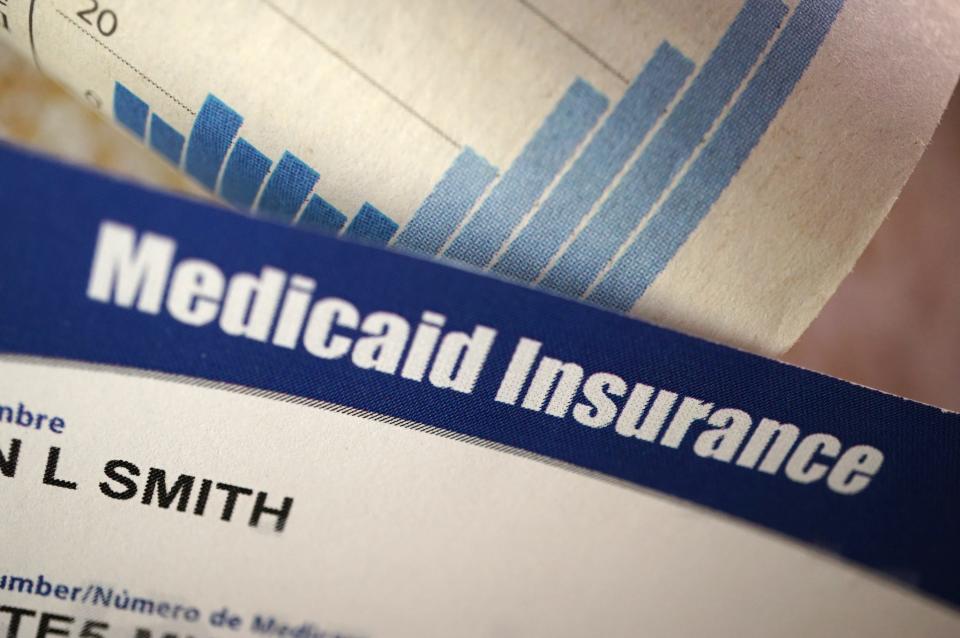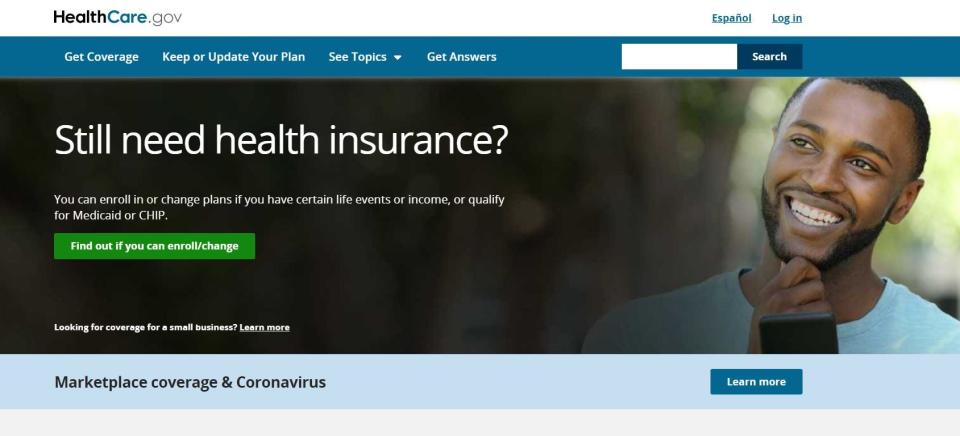3.17 million Michiganders must reapply for Medicaid. Why it matters now.
It’s been dubbed the unwinding of Medicaid or Medicaid redetermination.
What it means is that for the first time since the start of the coronavirus pandemic, people who have had their Medicaid insurance coverage automatically renewed each year will have to reapply to continue their coverage.
Those whose income has risen beyond eligibility requirements or who now qualify for employer-based insurance plans may be dropped from the program altogether. But some people who remain eligible likely will slip through the cracks and be taken off the Medicaid rolls — just because they didn't get the paperwork or didn't understand what to do with it.

“There are so many people who are going to have to renew Medicaid who have never done that before. There are also a huge number of people who will no longer be eligible for Medicaid and need to move to other coverage,” said Meredith Buhalis, program manager at the nonprofit Washtenaw Health Plan.
Dr. Renuka Tipirneni, an assistant professor at the University of Michigan whose research centers on the impact of health care policies on vulnerable populations, is concerned.
“Many people — potentially hundreds of thousands of people — could lose coverage in this time period,” said Tipirneni, who also is an internal medicine physician at Michigan Medicine. “And that's going be a mixture of both people who are eligible and those who are no longer eligible for Medicaid.
“The concern for many of us in the health care community is to keep people enrolled who are eligible. … This will require people who currently have Medicaid coverage to pay attention to a lot of what's coming up and get their paperwork submitted, which is sometimes easier said than done.”
More:Doulas say new Medicaid policy supports their work, but not them
More:When giving up a child is the only way to get needed help
Why is Medicaid redetermination happening?
When the coronavirus pandemic began, Congress passed legislation called the Families First Coronavirus Response Act, which included a provision requiring state Medicaid programs to keep people enrolled until the COVID-19 public health emergency ends in exchange for a boost in federal Medicaid matching funds.
Under the continuous enrollment provision, the ranks of people insured under Medicaid in Michigan grew by 700,000, the state health department reported.
Although the federal COVID-19 public health emergency won't end until May 11, Congress passed legislation to allow states to begin the Medicaid renewal process starting April 1.

How will it work in Michigan?
“Michigan has made some choices about how that will play out,” Buhalis said, and “people will go through a three-month process based on your Medicaid renewal month.”
Beneficiaries can check their renewal month at www.michigan.gov/MIBridges. From June 2023-May 2024, people will get notification on a rolling basis about their three-month window to apply.
If, for example, your Medicaid renewal month is August, you’ll get a letter in June informing you about the need to reapply for Medicaid, Buhalis said. The following month, July, you would get a renewal packet in the mail. And you’d have to submit the paperwork before the deadline in August to keep your coverage.
“For those who will not qualify for Medicaid anymore, we’re working very closely with those health plans so the individuals understand what their options are and what they might qualify for on exchange plans through the commercial market," said Elizabeth Hertel, director of the Michigan Department of Health and Human Services.

More:Growing number of grandparents face crushing costs as they raise kids
More:U-M to begin prescription drug delivery by drone in 2024
“We have had a huge network of people and organizations who've really been working together for a long time to make sure that people have continued coverage because it's so important ... that people have access. “
How many people will be affected in Michigan?
More than 2.1 million people in Michigan are enrolled in traditional Medicaid. Another 1.07 million are enrolled in the Healthy Michigan Plan, according to the state health department.
Altogether, that means about one-third of the state’s roughly 10 million people are covered by some form of Medicaid and will have to go through the reapplication processes within the next 14 months.
“We have never had to do this many redeterminations at one time,” Hertel said, adding: “We don't know how many people will no longer qualify."
Getting an accurate estimate in Michigan is a challenge, Tipirneni said.
"Who is still eligible? And of those who are eligible, who will complete the paperwork and all the steps required to reenroll? That, none of us actually know," she said. "But there's a decent chance that we'll have something on the order of hundreds of thousands of people who will no longer have Medicaid coverage within the next year."
Who is eligible for Medicaid?
Medicaid offers free or low-cost health insurance to those who qualify, depending on several factors, including age, income, disability, immigration and pregnancy status.
For kids, there's the Children's Health Insurance Program, or CHIP, which provides coverage through both Medicaid and separate CHIP programs funded by states and the federal government. To apply for Medicaid or CHIP plans, go to https://www.medicaid.gov.
The Healthy Michigan Plan is the state's Medicaid expansion plan that includes coverage for people with incomes above the federal poverty level.

More:At least 60% of maternal deaths in Michigan are preventable
More:Maternal mortality jumped 35% during pandemic's 1st 9 months, MSU study shows
To qualify for the Healthy Michigan Plan, you must be a Michigan resident from 19-64 years old, and your household income must be at or below 133% of the federal poverty level, which is about $18,000 a year for a single person or $37,000 for a family of four. You also can't be enrolled in Medicare or other Medicaid programs or be pregnant at the time of application.
Additional programs also insure pregnant women, low-income seniors and others.
I am eligible. How can I be sure I won’t lose my coverage?
“There are so many steps required and anyone could fall off at any step,” Tipirneni said. “Sometimes in health care, people have used the term Swiss cheese, where it's like you could fall through any of these holes.”
Among the holes in the redetermination process, she said, is if the state has an incorrect mailing address for you. Because all of the Medicaid renewal documents will arrive by mail, that single mistake could prove costly.
“People probably have moved around a lot in the last few years,” she said. “Having an updated address in the state system is important..”
You can make sure your address, phone number and email addresses are up to date at www.michigan.gov/MIBridges or by calling your local MDHHS office.
Also, keep an eye out for nondescript, plain envelopes in your mail pile, Tipirneni said. Don’t presume it's junk mail. Medicaid documents could be inside.
If your renewal month is approaching and you haven't gotten your Medicaid renewal documents in the mail, you can call the state health department at 855-789-5610 and ask for help.
What should I do if I no longer qualify for Medicaid?
Michiganders who no longer qualify for Medicaid will receive information about other options, including insurance plans available on the Affordable Care Act's insurance marketplace, HealthCare.gov.
There also are free, unbiased health care navigators who can help people understand their choices and weigh the options. Among them are:
ACCESS, the Arab Community Center for Economic and Social Services: Call 888-670-6798, go to accesshealthcaremichigan.org or email: enrollme@accesscommunity.org.
Genesee Health Plan Corp.: Call 844-232-7740 or go to geneseehealthplan.org for details.
Some nonprofit organizations, such as the Washtenaw Health Plan, also are available to provide free assistance to those who live in Washtenaw County or southeastern Michigan. To learn more, call 734-544-3030 from 9 a.m.-4 p.m. Monday through Friday or stop by the office in person at 555 Towner St., Ypsilanti.
“Many of the people who come to us are eligible for multiple programs,” Buhalis said. “It could be a family where the parents are eligible for the marketplace and the kids are eligible for Medicaid. So we don't want to send the parents away somewhere else to enroll. We want to be a one-stop shop to help people get access to health care.”
And some people who no longer qualify for Medicaid or for the Healthy Michigan Plan may still be able to get other assistance to reduce their costs, Buhalis said.
"Depending on your income, you may get advance premium tax credits or some assistance to pay your monthly premium," she said. "You may also get some extra help with copays, coinsurance and maximum out-of-pocket costs, depending on where your income falls.
"It can be very confusing, and we can help people figure that out because that's what we do all day. We help people."
Contact Kristen Jordan Shamus: kshamus@freepress.com. Follow her on Twitter @kristenshamus. Subscribe to the Free Press
This article originally appeared on Detroit Free Press: Medicaid rule could cost hundreds of thousands of Michiganders insurance

